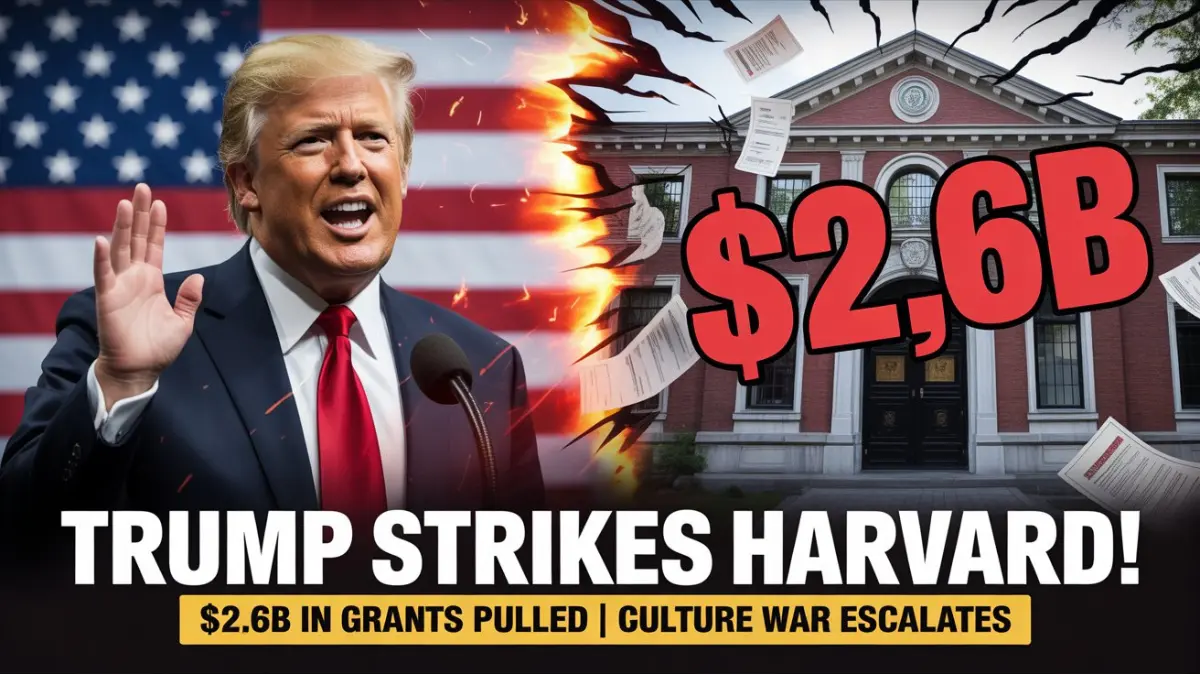In a bold escalation of the ongoing political battles over higher education, President Donald Trump’s administration has launched a sweeping campaign against Harvard University, leveraging federal power to reshape America’s academic landscape.
The moves include revoking billions in federal research grants, challenging the university’s tax-exempt status, and attempting to limit its enrollment of international students, actions that collectively threaten Harvard’s global stature and financial stability.
Federal Funding Slashed, Research at Risk
At the heart of the conflict lies a dramatic withdrawal of federal financial support. The Trump administration revoked approximately $2.6 billion in research grants, undermining Harvard’s standing as a world leader in scientific innovation. In 2024 alone, $686 million, or 11% of the university’s total operating revenue, was derived from these federal grants.
This funding has historically supported crucial advancements in fields such as pediatric cancer, Alzheimer’s research, and artificial intelligence. The sudden disruption raises serious concerns for the broader scientific community and national innovation efforts.
Despite Harvard’s $53 billion endowment, most of it is either earmarked for specific purposes or tied up in illiquid investments, leaving the university with limited flexibility to cover such losses. Donor restrictions often prohibit reallocating funds, making it difficult to plug financial gaps with endowment earnings.
Threats to Tax-Exempt Status and Accreditation
The Trump administration is also seeking to eliminate Harvard’s tax-exempt status, an action that could cost the university an estimated $465 million annually, based on Bloomberg’s analysis of its 2023 tax savings. Although only the IRS has the authority to revoke tax exemptions, Trump’s public threats and legislative backing have brought this scenario closer to reality.
Further, a recent tax law passed under Trump raised the tax on endowment returns from 1.4% to as high as 8%, another direct hit to elite universities’ finances. Simultaneously, the administration has floated the idea of challenging Harvard’s accreditation, an unprecedented move that would jeopardize the school’s academic credibility and its ability to issue recognized degrees.
Crackdown on International Students
Another key tactic in the administration’s arsenal is restricting international student enrollment. With 27% of Harvard’s student body coming from abroad, and many of those students paying full tuition, the financial and reputational impact of such restrictions could be severe.
The administration has subpoenaed data on international students and attempted to revoke the university’s ability to issue student visas. However, a federal judge in Boston issued a preliminary injunction against those efforts, citing the considerable damage even the uncertainty could cause.
Political Motives and the Culture War Context
Observers and critics argue the administration’s moves are less about policy and more about ideology. Harvard, often viewed as a symbol of liberal academia, has found itself at the center of broader conservative efforts to “reclaim” educational institutions from what they describe as the influence of the radical left.
The tension intensified following the U.S. Supreme Court’s decision to restrict race-based admissions, a case that directly involved Harvard, and during the aftermath of campus protests over the Israel-Hamas conflict. A statement from 30 student groups blaming Israel for the attacks drew sharp criticism and triggered accusations of antisemitism, further fueling political scrutiny.
The university’s first Black president, Claudine Gay, resigned under pressure after backlash related to her handling of campus unrest and subsequent allegations of academic plagiarism. Her successor, interim president Alan Garber, has pledged to combat both antisemitism and anti-Muslim bias, while defending academic freedom from government overreach.
Broader Implications for U.S. Higher Education
The conflict between Trump and Harvard may set a dangerous precedent. Other top-tier institutions, including Columbia, Princeton, Cornell, and Northwestern, have also had federal funding pulled. The implications reach far beyond Harvard, suggesting a broader effort to remake American higher education.
Critics warn this politicized pressure could discourage international talent, disrupt scientific progress, and shift funding responsibility toward private corporations and equity firms, raising ethical concerns about the commercialization of academia.
Harvard’s Legal and Institutional Pushback
In response, Harvard has filed multiple lawsuits to challenge the withdrawal of federal grants and the threats to its international student programs. The university’s resistance has garnered strong support from faculty, alumni, and parts of the academic community, positioning it as a leading voice in the fight for institutional independence.
Still, some suggest a more conciliatory approach might be required to navigate the ongoing political landscape without compromising academic integrity or financial stability.
Conclusion: A Defining Moment for U.S. Academia
What began as a targeted federal offensive against one university has evolved into a symbolic battle over the soul of American higher education. Whether Harvard’s resistance will succeed, and what long-term consequences this clash will have for the nation’s top research institutions, remains uncertain. But as two pillars of American influence collide, the outcome could reshape the future of education, scientific innovation, and free inquiry in the United States.
Also Read –
